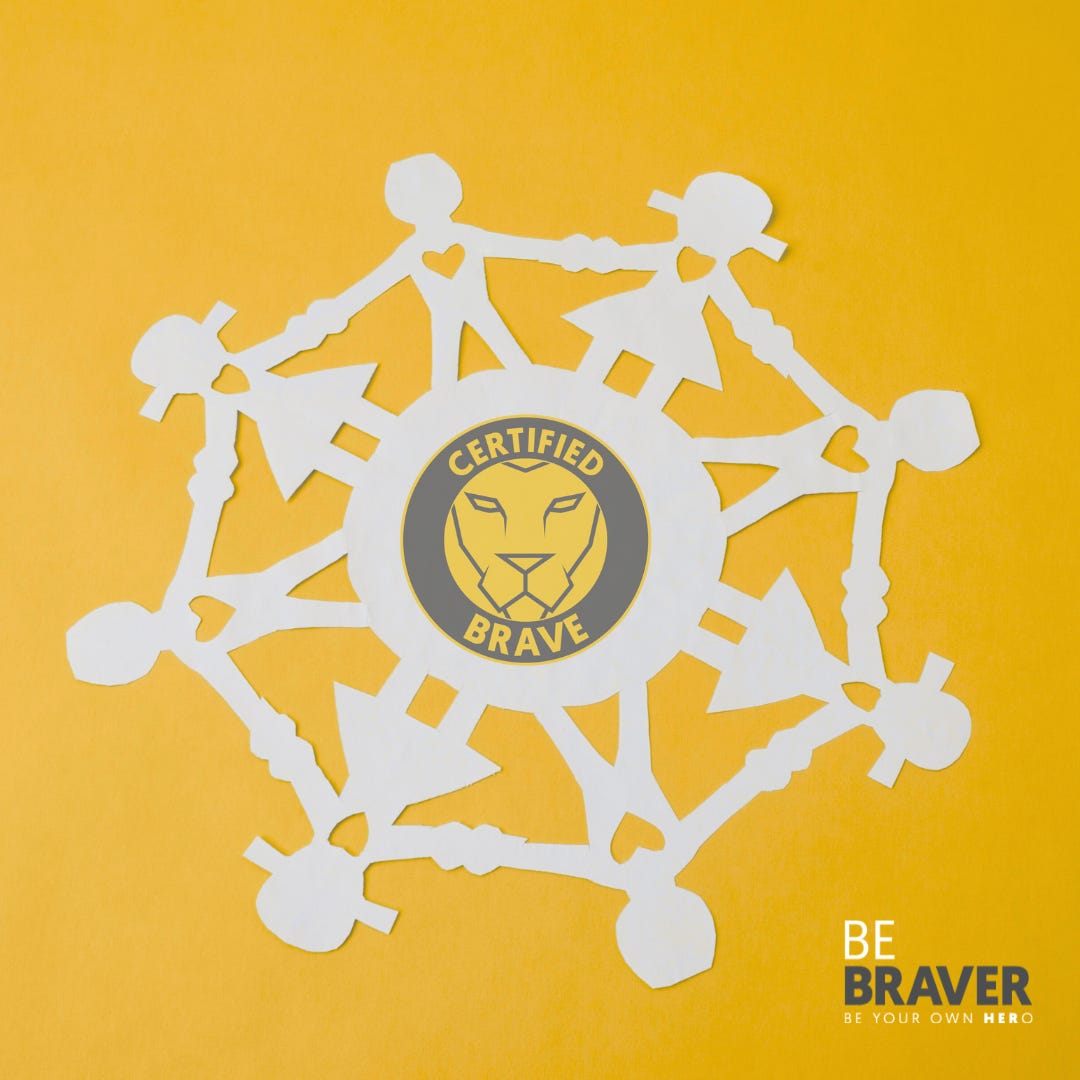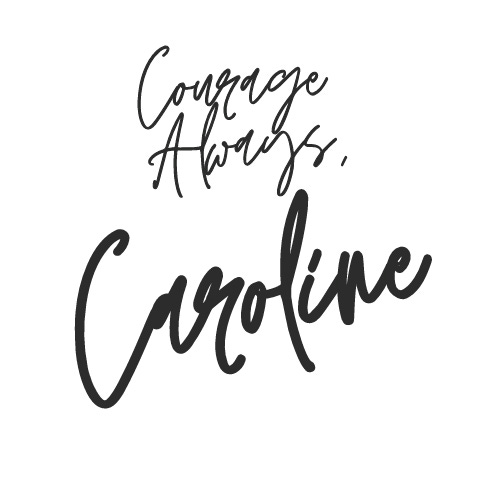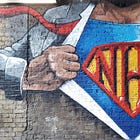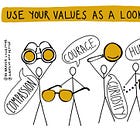Thinking Outloud #13: Why Quiet Courage Isn't A Solitary Act
Accountability may rest with you, but courage is built together.
Close your eyes and imagine a brave woman making a difficult decision. Acting on her principles and doing the right thing. The moments before, the moments after.
Do you see her standing outside a boardroom breathing deeply? Running to the bathroom after and pouring water on her face?
Or did you see her doing a round of fist bumps with her trusted advisors and teams before she went in? Knowingly looking at all the faces in the boardroom as she takes her seat? Excitedly running to call her sponsors and mentors afterwards?
The lone CEO making the hard call at 3am in the middle of the night alone. The entrepreneur risking everything on a hunch. The activist standing up to power, alone against the world.
The idea of the lonely figure with the weight of the world on their brave shoulders is the limiting view that stops us seeing our courage, and unlocking the capability of it to fuel and supercharge our teams and communities.
These stories of the solitary leaders making hard decisions are compelling - but they are also a little incomplete.
In my conversation last night with Burnout Rebellion, I found myself returning to something fundamental about the Be Braver approach: Courage is rarely done alone, even when it feels that way.
The Reality Behind Brave Moments
Here's what I've learned working with leaders and teams who consistently make brave choices: they understand something many miss.
Yes, the moment of decision might be solitary. Yes, you hold the accountability. But the capacity to be braver? That's built long before the crucial moment - and it's through connection.
Think about the last time you made a genuinely courageous decision.
Now dig deeper: What made it possible? Who made it possible? How?
Was it the mentor who helped you see your blind spots? The colleague who had your back? The network that gave you options when things went sideways? The loan from a friend? The spare room from a family member? The skills you'd developed through relationships with teachers, coaches, or peers?
Connection doesn't dilute our bravery - it distills it into something stronger.
As I write this, what is springing to mind is my experience as a juror. For 3 weeks we listened and debated on a very heavy trial that would determine where a man would spend the rest of his life.
It took incredible courage to stand up and deliver the verdict. In the courtroom, in front of all the families and the defendant. Yet the bravery it took to speak those words was the culmination of a process of shared deliberations.
There's no getting away from how surprisingly weighty that act feels in the end. But we all made the decision together. The courage to deliver that verdict wasn't mine alone - it was built through weeks of collective reasoning, challenging each other's assumptions, and supporting one another through an impossible responsibility.
The moment felt solitary. The capacity was collective.
The Three Pillars of Courage Connection
In the Connection module of Be Braver, we help leaders and teams understand courage as a relational act. Here's one way of thinking about how it works: -
1. Safety Networks
The people who create psychological safety - the foundation that lets you take intelligent risks. These aren't cheerleaders telling you everything will be fine. They're the ones who help you think through consequences, who'll catch you if you stumble, who remind you of your capabilities when doubt creeps in.
2. Resource Networks
Access to knowledge, skills, tools, and opportunities that inform and embolden your decisions. Sometimes courage fails not because we lack heart, but because we lack information, capabilities, or pathways forward.
3. Meaning Networks
The conversations and connections that remind you why the risk matters. The communities that share your values. The relationships that help you remember what you're fighting for when the going gets tough.
Closing the Courage Capacity Gap
Here's where most courage-building approaches fall short: they focus on the moment of decision rather than the infrastructure that makes brave decisions possible. Or simply the risks and the desire to avoid experiencing them.
In Be Braver, we explore what I call courage capacity gaps - the missing connections, resources, or support systems that keep us playing small. When we name and systematically close these gaps, something remarkable happens: courage stops feeling like summoning lightning from thin air and starts feeling like turning on a switch.
Some questions to consider:
People gaps: Who in your network challenges your thinking? Who has your back when you take risks? Who opens doors you can't open yourself?
Knowledge gaps: What skills, information, or perspectives would make you more confident in taking the leap?
Resource gaps: What tools, funding, or practical support would eliminate the barriers to your brave action?
Meaning gaps: What connections to purpose, community, or impact would remind you why the risk is worth taking?
The Courage Ecosystem
The most consistently brave people I know don't rely on individual heroics. They've build a courage ecosystem - a network of relationships, resources, and practices that makes brave action sustainable rather than sporadic. A sustainable way to live courageously and not burnout in the process.
They've done the work before they need the courage. They've invested in connections that compound their capacity for risk-taking. They've built systems that support them through the inevitable challenges that come with living and leading bravely.
This isn't about outsourcing your courage - it's about resourcing it properly.
Your Courage Connection Audit
Take a moment to map your current courage ecosystem:
Who are your courage amplifiers? The people who make you braver by their presence, support, or challenge.
Where are your resource gaps? What knowledge, skills, or tools would increase your confidence to act?
What connections to meaning and purpose fuel your willingness to take risks?
Which relationships or resources feel missing from your courage toolkit?
The answers will show you where to invest your connection-building energy.
Building Brave Together
Courage might feel individual, but it's built collectively. The leaders and teams who consistently make brave choices understand this fundamental truth: we become braver in relationship with others.
So stop trying to summon bravery from thin air. Start building the connections that make courage inevitable.
Your next brave act is waiting- not for you to find more willpower, but for you to build better connections.
Remember:
Growing connections is a value exchange. When you start to notice where you have gaps, you will find you also have something to offer which will fill someone else’s gaps.
So before you start talking yourself out of taking action - have a good thing about where you need to build some bridges, and what you have to offer in return.
Here’s a cheeky little worksheet to help get you started.
A link to an article that might expand where you look to grow your network
Ready To Lead With Impact?
Don’t just read about courageous leadership - practice it.
The Be Braver programme starts this September and is designed exclusively for women in data, communications, and technology. You’ll join a peer group of ambitious leaders to build the mindset, visibility, and influence needed to lead with authority.
What you’ll gain:
A practical leadership toolkit you can apply immediately to yourself and your team
Peer-group accountability with like-minded women facing similar leadership challenges
Real-world frameworks to help you speak up, take space, and drive change confidently
Strategies to grow your visibility and lead with presence—without waiting for permission
Expert guidance on leading high-performing teams in complex, fast-paced environments
Join us this September. Lead smarter. Be seen. Be braver.
I work with organisations and teams, mostly new and emerging leaders, to help them understand what courage looks like in practice. My approach blends research, psychology, and lived experience into practical frameworks leaders can use in moments that matter: high-stakes conversations, major transitions, values-based decisions, and deep uncertainty.
I also work privately with individuals and love collaborating with others who are passionate about reshaping leadership, equity, and well-being. I’m especially interested in funding and partnerships that support sustainable, long-term impact for young people and marginalised communities, those who often need courage the most, but are resourced the least.












Thank you for this, it’s so important. The net of support is so vital to uplift before something and fall into afterwards. Those voices you can debrief with and tell them when it didn’t go to plan, what’s hard, what hurts 🫶🏽
For me lone acts of bravery feel like pushing through fear. Those supported by community or by asking for help (human and divine) feel like inevitable forward motion. Xx